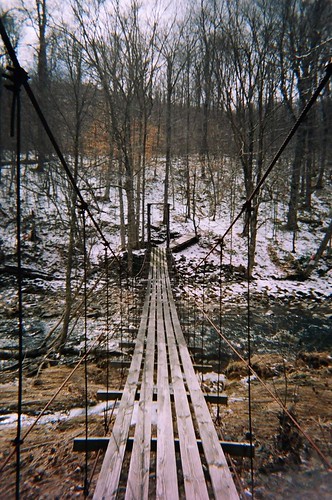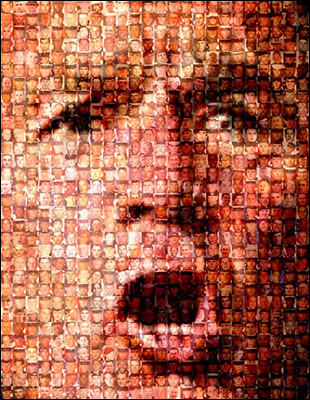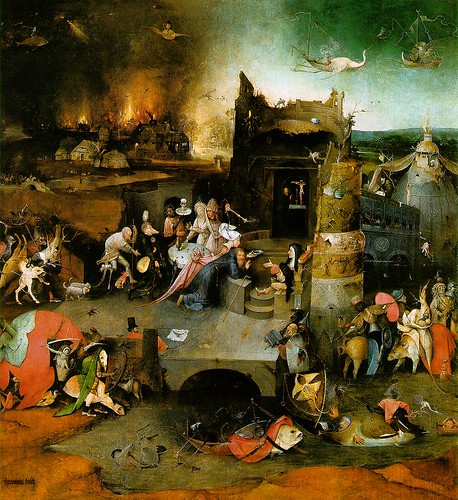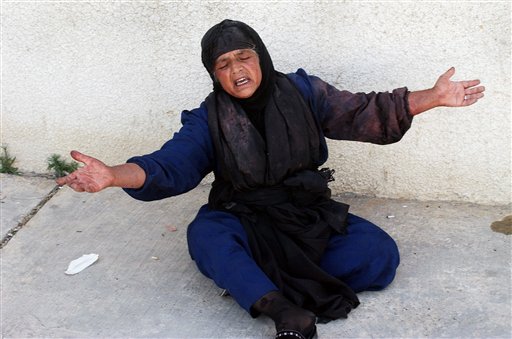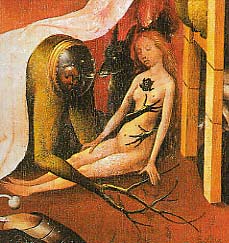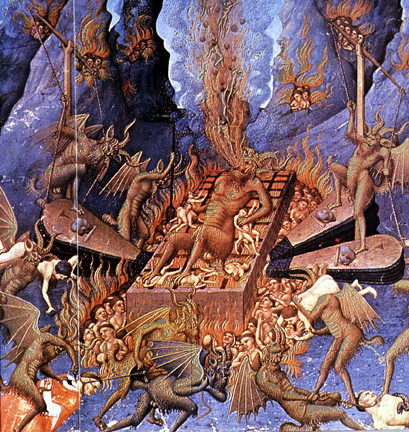Tuesday, June 27, 2006
Silly Limericks
Who had trouble exploring the bush
So he smuggled some pills
That would jack up his thrills
And wound up with a glove up his tush
Privacy, it seems, only applies
To those who are hired as spies
For the average bloke
Secrecy’s naught but a joke
So says the president who lies
This morning as I performed my ablution
I sought for myself some solution
To our troubles and strife
In this knocked around life
And I thought, maybe, ‘tis revolution
Monday, June 26, 2006
Don't call me Hysterical
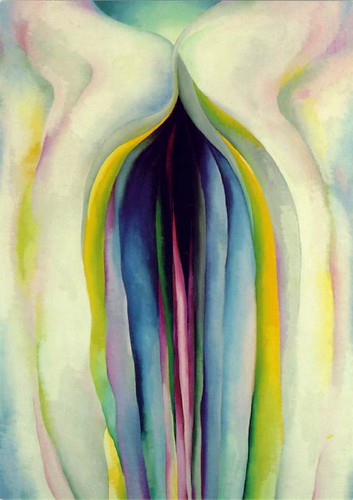
Shortly before I underwent a hysterectomy in November, I received an anonymous letter via e-mail. I had not been shy about my need for surgery. I am more than aware that my uterus is a political organ. I fear that just as SCOTUS has recently ruled that there's no need for a "knock-knock" before violating civil rights, so too, it will soon be permissible to enter a woman's vagina without her consent. Or, as the case is more likely to be, to tell a woman that she can't make decisions about what may or may not enter and lodge inside her uterus.
And so, knowing that the personal is political, to quote what was once a revolutionary statement but which seems to have lost its meaning, I chose to write about my decision, and my fear, in undergoing this procedure.
Thus, someone out in the blogosphere decided to send me a letter, under a pseudonym, in which they denounced my decision to be public about what I was about to undergo. In the letter, the person described to me how I'd been duped by the male medical establishment, how six months after my surgery I would begin to suffer the horrible effects of various blood vessels dying in my pelvic region, how I would feel like shit. And worse, this person pointed out, I would be responsible for the positive push I may have given other women to have the same operation done. That by talking positively about my decision to have my uterus removed, I was contributing to the ruin of other women.
All of this vitriol arrived just a few days before my surgery.
And so, given that it is now over seven months since my operation, I feel that I should check in with the world, and let other women know what the effects have been of having my political organ removed.
I feel fantastic. The condition that necessitated surgery was adenomyosis, a condition in which I bled profusely throughout the month. It was unpredictable, and frequently, in the middle of sexual intercourse, I would start hemorrhaging. I have never been squeamish about sex during menses, and I've been fortunate that I've had partners who were also not turned off by blood. So, the blood was not the issue. The issue was the constant pain, and the weakness caused by anemia. I felt sick all the time. My uterus was approximately the size of a 13-week pregnancy, and for someone who is tiny like me, it meant that my stomach bulged. Again, no big deal. But I felt permanently bloated.
We tried other therapies to alleviate the problem. They didn't work, and in fact, made things worse. One night, after having hemorrhaged for the entire day, and now, too weak to stand, a friend took me to the emergency room. My gynecologist came in to see me, and we decided then that there was no point in putting off the surgery. It was time to overcome my fears and do what was best for me.
My biggest fear about hysterectomy was about sex. And so, I want to talk frankly about that here.
I was deathly afraid that I would no longer be able to have orgasms, or if I did have them, that they would be pale shadows of their former selves. For me, orgasms build, and when they reach their crescendo, I feel contractions deep inside of me--intense, starbursts of pleasure that I had always assumed was the result of my uterus responding to the electricity racing across my flesh. How would I experience that level of pleasure if there was no uterus to contract?
I was haunted by the idea that I would lose a sensation that is of paramount importance to me. Perhaps it makes me shallow, this desire to feast at the full banquet of sex. But I believe that there are few things that are freely available to us, and for me, sex--both the connection I feel to another human being and the loss of boundaries I experience during orgasm--is an integral part of who I am.
I was terrified of losing that.
After surgery, one is advised not to have intercourse for six weeks. For the first couple of weeks after surgery, I felt awful. I lost a lot of blood during the procedure, and my iron level was down to 27 (normal is 42). So, I wasn't thinking a lot about sex. But, things started to wake up, and I decided to take matters into my own hands, so to speak. When the orgasm came--complete with the deep sensations of contraction and vibration--I wept. I wept. I called my closest friends. I shared my joy. I felt no shame in doing so. And, when I was able to resume intercourse, it was to discover that everything still worked. In fact, it worked better, as I now did not feel this sluggish, clogged-up sensation in my pelvis.
And life without periods has been interesting. I don't bleed, of course, but since I still have my tubes and my ovaries, I experience a normal cycle, complete with bloating, crankiness, and breast tenderness. Woohoo!
I realize that for many, this may be too much information. But I was open about having the procedure before I had it done, and I feel an obligation to let those who reached out to me prior to surgery know that I'm well. I'm fabulous.
I also want to say that there were women who reached across the internet to let me know that I would be okay. They shared their experiences with me privately. And I thank them for that. I may cringe when I see this posted, but I just want to reach out to those who may be in similar positions to the one I was in last fall and tell them: it's okay. It will be okay.
Friday, June 23, 2006
Quote of the Day
Taking such a broader approach to "life issues" would affect evangelical attitudes not only toward abortion and capital punishment but also to matters related to race and to the poor. The social and economic policies of this nation seem to have created a permanent underclass. If evangelicals believe that God cares about the fate of a fetus, it shouldn't require a huge leap in logic to surmise that God also cares about people of color or prisoners or immigrants or people with an orientation other than heterosexual.
"Jesus is Not a Republican" by Randall Balmer
Well, Shut My Mouth
Sup?
WTF?
Quit busting my balls.
Quit jerking my chain.
Damn straight.
They 86'd the book from the library.
I can't even begin to imagine the logic behind this, but it gets better. Another book that got banned was... wait for it...
Junie B. Jones and Some Sneaky-Peak Spying

Junie!! How could you????
What kind of asinine organization bans Junie B. Jones? And why that particular book? Why not ban Junie B. Jones is a Barber Shop Guy? I'm telling you, that book is a hell of a lot more dangerous. It actually suggests that children should pick up a pair of scissors and cut their own hair.
I went to the Called2Action web site, and no, I'm not going to provide a link to them; they're idiots. But I read up on the urgent action that was needed to ban certain books from Wake County Schools. Among the books were the usual suspects: Beloved, The Color Purple, The Chocolate War. But I cannot find anything on poor old Junie.
Does anyone know why Junie's been banned in Wake County???
Thursday, June 22, 2006
Carnival of the Feminists Includes Me
The 18th Carnival of the Feminists will be held at Ink and Incapability. Check out the call because, while the topics are wide open, there are also some intriguing possibilities for essays.
Appetites
I was at the mall last night. I loathe the mall, and yet, I find myself there fairly frequently. The village where I live has no pharmacy, nothing other than a small convenience store that charges convenience store prices. So all necessities come from the mall and the large grocery store next to it. Thus, my position at a table in the Food Court, eating Subway sandwiches with my daughter for our late dinner.
As usual, I was people watching. The college students are gone, flown like robins in reverse. They’ll return in the waning days of summer, and change the character of this area. Last night, it was locals. And I started noticing something. Virtually everyone was carrying around extra weight. Lots of belly fat. Some of them were so slowed up by the extra weight that they lumbered. I started looking for lean people. There were a few, but as a percentage, it was less than 20 percent.
I know that we’re engaged in a national crisis over American obsesity. We blame television, and our sedentary lifestyles, and the availability of cheap, high-fat food. We drink too much soda. We eat too much candy and potato chips and fast food. We don’t exercise. It’s all our fault. We’re the richest nation on earth and we’re a bunch of slobs. Blah Blah Blah.
I’d like to offer some thoughts.
I have been re-reading Caroline Knapp’s brilliant book: Appetites: Why Women Want. In it, Knapp (who died way too young at 42 of cancer) wrote of women’s appetites: for food, for sex, for material goods. She did not condemn desire. Rather, in a complex argument that I’m treating schematically here, she looked at how desire is twisted in our culture. For white, middle-class women especially, (and Knapp admits that her observations/experiences are based on her own position as white and middle class) thwarted desire lies at the heart of many of our cultural maladies.
It is the illusion of choice that thwarts the desire. It is the illusion that a well-educated, intelligent white woman is going to have access to real power in this culture that ultimately turns desire in on itself, twists it, cripples it, so that the thwarted desire becomes the source of suffering. In a way, it’s the Noble Truths of Buddhism. In another way, it’s what it’s like to be told you have power in America when you do not.
And Knapp argues that for women, who despite the seeming accommodations made for women’s liberation by the powers that be, are especially affected by this thwarted desire. As I said, she’s writing as a white, middle-class woman, and how this thwarted desire manifests itself in other groups of people is not in her expertise. But her argument spoke to me.
Knapp was an anorexic. In a way, this provokes a “ho hum” reaction in me. After all, just how many more books do we need to read about white anorexia? But this book spoke to me because I also have an eating disorder. I’ve made no secret of the fact that I’ve dealt with bulimia for the last several years. I thought it was a thing of the past. But the past few months, when I’ve been cloistered in a cave of depression, the bulimia called to me. And sometimes, I answered that call.
It’s embarrassing to admit. What sane, dignified, intelligent person wants to admit that sometimes, after eating a meal, or a bar of chocolate, or an ice cream sundae, she would stick her finger down the back of her throat and vomit? Especially one who is the mother of two daughters and who is desperate for them to not emulate that kind of behaviour? I found ways of being secretive about it, including going outside and vomiting in the backyard, away from the house. In the dark. Alone. So no one could see. It wasn’t a full-scale relapse. But it happened often enough that I could smell relapse in the miasma of my own vomitus.
My depression has been fueled by a few things. Basic brain chemistry, for one. My genetic line on both sides of my family condemn me to craziness of various stripes. I am beyond grateful that my brain chemistry can be treated with drugs, and I no longer worry about the fact that I have to take antidepressants. Illness is illness. But on top of the brain chemistry has been a situational depression. All of it fueled by utter powerlessness. It ranges from the national—I live in a country run by people from whom I feel completely alienated—to the more personal—my job bores the bejesus out of me for reasons that are too lengthy to go into here. And, added to that is the constant worry, as a single mom, that I am literally a single paycheck away from not being able to feed my children. It’s a potent combination, and there have been many days in the past three months where that combination has knocked me on my ass. Or, knocked me to my knees, bending over a toilet.
I will tell you one more thing before I get back to those folks at the mall. Every time I threw up in the past three months, I was entirely conscious of what I was doing. The conversation went something like this: “Throwing up is not going to solve your problems.” And the response in my head was always something like, “Fuck you. It’s going to make me feel better.” In a situation where I cannot seem to move myself out of the position I’m currently in, the fact that I could manipulate my body endorphins, exercise control over my food intake, hurt myself, was moving myself. It was power. False power. But power nonetheless.
So, I look around and I see a lot of folks who are obese. And I found myself wondering why there has been such a growth of obesity in the past couple of decades. And all the reasons in the third paragraph still apply.
But I think there is another facet to all of this. We, as a nation, do not know how to make ourselves feel better. We do not know how to move ourselves out of the positions that the vast majority of us find ourselves in. We have been gradually stripped of our power. We cannot afford to buy the toys that we could that distracted us. When I was a kid, many, many people had RVs, and boats, and a new car every year. Middle class folks. But the middle class is drowning, and the poor, well, the poor are long underwater.
So, what do we have? We have food. Cheap, fattening, sweet food. And our televisions. The solace of food is what many of us give ourselves because we have nothing else. We can see what we want: it’s there on our television sets every night. Taunting us. But we cannot have it. We send our children off to fight in an unjust war. We work our barely-getting-by jobs. We struggle to make ends meet. And we eat. It doesn’t change anything. But for those moments when that sweetness is on our tongues, we feel better in our powerlessness.
Wednesday, June 21, 2006
Fundamentalism (again)
 Those of you who've schlepped through my posts before know that I tend to focus my attention on certain issues. Fundamentalism scares the bejesus out of me, for example, and I've been known to pick at it a time or two.
Those of you who've schlepped through my posts before know that I tend to focus my attention on certain issues. Fundamentalism scares the bejesus out of me, for example, and I've been known to pick at it a time or two. So, imagine my delight when I came across this article today. "The four fundamentalisms and the threat to sustainable democracy" by Robert Jensen presents a provocative argument that it is not just religious fundamentalism, but a variety of fundamentalisms that create a threat to sustainable democracy here in the United States.
Let's start by defining fundamentalism. The term has a specific meaning in Protestant history (an early 20th century movement to promote "The Fundamentals"), but I want to use it in a more general fashion to describe any intellectual/political/theological position that asserts an absolute certainty in the truth and/or righteousness of a belief system. Such fundamentalism leads to an inclination to want to marginalize, or in some cases eliminate, alternative ways to understand and organize the world. After all, what's the point of engaging in honest dialogue with those who believe in heretical systems that are so clearly wrong or even evil? In this sense, fundamentalism is an extreme form of hubris, a delusional overconfidence not only in one's beliefs but in the ability of humans to know much of anything definitively. In the way I use the term, fundamentalism isn't unique to religious people but is instead a feature of a certain approach to the world, rooted in the mistaking of very limited knowledge for wisdom.
It's funny that Jensen uses the term hubris. I tend to reserve the term as that which applies to people I consider tragic heroes, the classical sense of the term, where the one flaw (and it's always fatal) is to have pride great enough that one thinks one is better than the gods. For that, people are made to suffer, To be struck down.
While I agree with Jensen in principle, I think the word I would use is "narcissism." The sense that it's all about me. My interpretation. My beliefs. That I should always get my way, and I'm going to make you suffer in order to bring you around to that point of view. And, as part of that, I'm going to intepret a text or a word in the ways I see fit.
The antidote to fundamentalism is humility, that recognition of just how contingent our knowledge about the world is. We need to adopt what sustainable agriculture researcher Wes Jackson calls "an ignorance-based worldview", an approach to world that acknowledges that what we don't know dwarfs what we do know about a complex world. Acknowledging our basic ignorance does not mean we should revel in stupidity, but rather should spur us to recognize that we have an obligation to act intelligently on the basis not only of what we know but what we don't know. When properly understood, I think such humility is implicit in traditional/indigenous systems and also –the key lesson to be taken from the Enlightenment and modern science (a contentious claim, perhaps, given the way in which modern science tends to overreach). The Enlightenment insight, however, is not that human reason can know everything, but that we can give up attempts to know everything and be satisfied with knowing what we can know. That is, we can be content in making it up as we go along, cautiously. One of the tragedies of the modern world is that too few have learned that lesson.
Here, I agree. I've talked before about my fear of control freaks: those people who are so afraid of things being out of their control that they set out to control all of us. To make us comply with what makes them feel safe. And, once again, that's a type of narcissism. And it's fear. I think, at its heart, it's about the fear of the greatest thing out of our control: death.
Death comes to all of us. You're going to have to take my word on this, even though I know there are people out there (not necessarily anyone here on this site) but certainly, members of this administration, who I swear think that they can make some kind of Faustian bargain, can unlock the secret to eternal life if they just control-freak their way over the rest of us. (Are you listening George, Dick, and Donald? Death is coming for you, and there's not a damn thing you can do about it. But I will tell you one thing: killing Iraqis and American soldiers is not the bargain that Mephistopheles is looking for. That's fucking garden-variety bargaining. Get some imagination.)
And so, Jensen identifies four varieties of fundamentalism that he sees as especially inimical to democracy: religious, economic, nationalism, and technological fundamentalism. His arguments for each of these is compelling, and I invite you to read the article in full.
One of my favourite parts of the article is his discussion of economic fundamentalism, especially this quotation:In other words, economic fundamentalism - the worship of markets combined with steadfast denial about how the system actually operates - leads to a world in which not only are facts irrelevant to the debate, but people learn to ignore their own experience.
Capitalism is a funny thing: market fundamentalism teaches us that we would all be better off if we all have an opportunity to make it based on our own merits. That if we work hard enough, and are clever and talented enough, we'll "make it afterall." But certainly my experience--as an over-educated, single, divorced mother tells me something completely different. And so which am I to believe? The ideology or the reality? And is my reality your reality? And if, in fact, experiences differ among us, as we know they do, how then can there be a fundamentalist adherence to an economic system that doesn't work for the majority of us?
After Jensen has reviewed the four types of fundamentalism, he turns to his suggestions for future resolution of the problems. And, like a good anti-fundamentalist, he doesn't claim any one answer as the gold standard. He does, nevertheless, end the article on a note of hope. It's not a false hope, the kind born of "happily ever after" or "the sun will come out tomorrow." It's rather the hope that I always admire, that kind of Camusian hope that life is fucking hard, and yet we prevail. We don't get what we want, but what comes to us can be enough. That sometimes, the monsters do come in the middle of the night, but they can be faced down and sent on their way. That there doesn't have to be just one way of looking at things. That all things are possible, even if all things will not be.
And I can live with that.
I'm Back
So, it's not like there isn't plenty of Lorraine out there on the Internet.
But Stregoneria has been calling to me of late. A place to call my own. So, my plan is to post here and to crosspost in the usual places.
Welcome back!
Pablo Neruda
Evil one, neither fire nor hot vinegar
in a nest of volcanic witches, nor devouring ice,
nor the putrid turtle that barking and weeping
with the voice of dead woman scratches your belly
seeking a wedding ring and the toy of a slaughtered child,
will be for you anything but a dark demolished door.
Indeed.
From one hell to another, what difference? In the howling
of your legions, in the holy milk
of the mothers of Spain, in the milk and the bosoms trampled
along the roads, there is one more village, one more silence, a broken
door.
Here you are. Wretched eyelid, dung
of sinister sepulchral hens, heavy sputum, figure
of treason that blood will not erase. Who, who are you,
oh miserable leaf of salt, oh dog of the earth,
of ill-born pallor of shadow?
The flame retreats without ash,
the salty thirst of hell, the circles
of grief turn pale. Cursed one, may only humans
pursue you, within the absolute fire of things may
you not be consumed, not be lost>
in the scale of time, may you not be pierced by the burning glass
or the
fierce foam. Alone, alone, for the tears
all gathered, for an eternity of dead hands
and rotted eyes, alone in a cave
of your hell, eating silent pus and blood
through a cursed and lonely eternity. You do not deserve to sleep
even though it be with your eyes fastened with pins:
you have to be
awake, General, eternally awake
among the putrefacation of the new mothers,
machine-gunned in the autumn. All and all the sad children cut to
pieces,
rigid, they hang, awaiting in your hell
that day of cold festivity: your arrival.
Children blackened by explosions,
red fragments of brain, corridors filled
with gentle intestines, they all await you, all in the very posture
of crossing the street,of kicking the ball,
of swallowing a fruit, of smiling, or being born.
Smiling. There are smiles
now demolished by blood
that wait with scattered exterminated teeth
and masks of muddled matter, hollow faces
of perpetual gunpowder, and the nameless
ghosts, the dark
hidden ones, those who never left
their beds of rubble. They all wait for you
to spend the night. They fill the corridors
like decayed seaweed.They are ours, they were our
flesh, our health, our
bustling peace, our ocean
of air and lungs. Through
them the dry earth flowered. Now, beyond the earth,
turned into destroyed
substance, murdered matter, dead flour,
they await you in your hell.
Since acute terror or sorrow waste away,
neither terror nor sorrow awaits you. May you be alone and accursed,
alone and awake among all the dead,
and let blood fall upon you like rain,
and let a dying river of severed eyes
slide and flow over you staring at you endlessly.
Pablo Neruda General Franco in Hell translated by Richard Schaaf.
A note on this diary: I've been reading the poetry of Pablo Neruda lately. When I read this poem, about Franco, I was struck by how much of the anger that Neruda poured toward the butcher of Spain I feel toward our current president.
I'm not much of a visual thinker, but I wanted to try to pull images--both old and new--together to illustrate my feelings, and to link Neruda's rage and my own.
One of the images is copyrighted and comes from Dahr Jamail.
